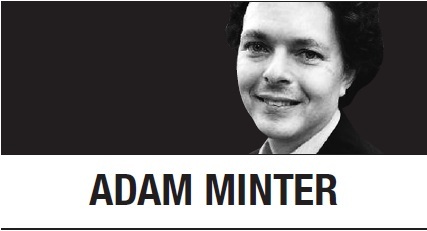[Adam Minter] Killing junkies doesn’t work in Asia either
By BloombergPublished : March 4, 2018 - 17:50
 US drug dealers, beware. According to a recent report in Axios, President Donald Trump admires the freewheeling and brutal manner in which some Asian governments handle drug offenders. “You know, the Chinese and Filipinos don’t have a drug problem,” a senior administration official paraphrased Trump as saying. “They just kill them.”
US drug dealers, beware. According to a recent report in Axios, President Donald Trump admires the freewheeling and brutal manner in which some Asian governments handle drug offenders. “You know, the Chinese and Filipinos don’t have a drug problem,” a senior administration official paraphrased Trump as saying. “They just kill them.”In one sense, Trump is right. Over the last two decades, Asia has executed a disproportionate number of drug suspects compared with the rest of the world. In the Philippines alone, more than 12,000 people accused of using or dealing drugs have been killed over the last two years, often in extrajudicial executions. But, contrary to Trump’s belief, the bloody toll from Asia’s drug wars hasn’t deterred addiction or prevented drug crimes. Instead, it’s led many of the region’s most prominent governments to rethink their approach.
While Asia has cultivated and used drugs since ancient times, epidemic drug addiction first flourished in 19th-century China, when 15 million Chinese became addicted to opium. Over the next century, urbanization and drug innovations fostered new addictions to substances ranging from heroin to modern-day synthetic drugs such as methamphetamine. Today, Asia is the world’s major producer of opiates and precursor chemicals for the production of methamphetamine. It’s also a major center of addiction to these substances.
Asian governments have typically viewed any drug use as a criminal issue. China, for example, has focused on imprisonment and executions since the 1950s. Others followed the same path. Starting in the 1970s, countries ranging from Singapore to Vietnam created criminal codes with low thresholds for executing traffickers, dealers and users. Yet, even as the region’s drug enforcement apparatus developed, so did drug addiction. By the early 1990s, 40 years after Mao’s eradication campaigns, Chinese officials were forced to concede that entire villages were once again addicted to opiates arriving from Myanmar.
Rather than question their focus on harsh punishments, China and Southeast Asian nations, including Malaysia and Singapore, doubled down through the mid-2000s. Thailand, which launched a “war on drugs” in 2003 that claimed the lives of 2,800 people, was the most extreme example, but it was hardly alone. Of the 408 people executed in Singapore between 1991 and 2000, 247 were hanged for drug crimes. In 2011, Malaysia reported that it had executed 479 people under its Dangerous Drugs Act since 1961 -- accounting for 69 percent of all executions. And in China, the world’s leading executioner, at least 13 percent of death-penalty sentences are related to drug crimes. Executions often take place during highly publicized mass events.
Yet, evidence that executions serve to deter drug use or crimes in Asia is virtually nonexistent. For example, the Chinese government reported that the number of registered Chinese drug addicts increased 6.8 percent in 2016 to 2.51 million, up from 901,000 in 2001. The growth has been fueled by new synthetic drugs like methamphetamine, seizures of which surged 106 percent in 2016.
In Singapore, 3,089 “drug abusers” were arrested in 2016 (40 percent of whom were identified as new abusers), compared with 1,127 arrested in 2006. In Malaysia, the number of newly registered drug addicts rose from 10,301 in 2012 to 22,923 in 2016. And in Indonesia, which has executed local and foreign drug traffickers in recent years, the number of addicts increased from 3.6 million in 2011 to 5.9 million in 2015.
The most compelling evidence that executions have failed as an anti-drug strategy is the fact that many Asian governments have begun to retreat from them. The trend can take modest form, such as Singapore’s 2012 decision to reduce the number of drug crimes eligible for mandatory executions, or China’s quiet, decadelong effort to open methadone clinics and voluntary rehabilitation facilities.
Others have proven more ambitious. For example, Thailand’s military government -- not known for its concerns about human rights -- has publicly conceded that the country’s bloody war on drugs has been “wrong the whole time.” It’s now advocating drug legalization and a shift to preventative rehabilitation. In December, Malaysia removed a 34-year-old mandatory requirement for death penalties in drug cases and began a long-term program to refocus its efforts on rehabilitation.
The Philippines and its recent, bloody war on drug crimes remains an exception. But it’s an outlier of little influence, and neighbors such as Malaysia are publicly distancing themselves from a strategy they’ve seen fail at home. As President Trump continues to mull a workable response to the US opioid crisis, he would be wise to learn from Asia’s actual successes and failures -- and not just the cliches that appeal to his shoot-from-the-hip instincts.
Adam Minter
Adam Minter is a Bloomberg View columnist. -- Ed.
(Bloomberg)












![[Today’s K-pop] BTS pop-up event to come to Seoul](http://res.heraldm.com/phpwas/restmb_idxmake.php?idx=644&simg=/content/image/2024/04/17/20240417050734_0.jpg&u=)




![[KH Explains] Hyundai's full hybrid edge to pay off amid slow transition to pure EVs](http://res.heraldm.com/phpwas/restmb_idxmake.php?idx=652&simg=/content/image/2024/04/18/20240418050645_0.jpg&u=20240419100350)

![[Today’s K-pop] Zico drops snippet of collaboration with Jennie](http://res.heraldm.com/phpwas/restmb_idxmake.php?idx=642&simg=/content/image/2024/04/18/20240418050702_0.jpg&u=)